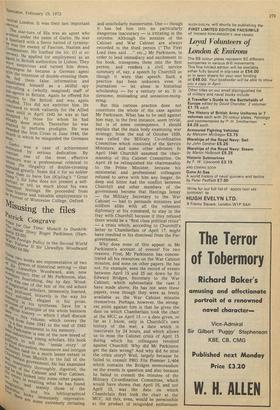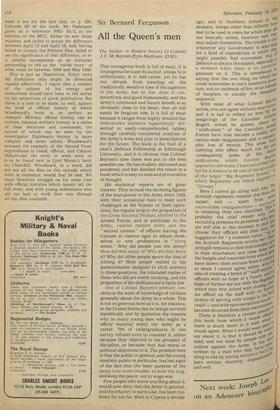Misusing the files Patrick Cosgrave P eCIPp for Our Time: Munich
.to Dunkirk: -.e Story Roger Parkinson (Hartritish • 0) Policyin the Second World (1-4,4'0V°iLiMe II Sir Llewellyn Woodward £4.50) Tiles disue two books are representative of two of 'riot genres of historical writing — that ne„S,ir Llewellyn Woodward, alas, eve'"Y eXtinct; that of Mr Parkinson, alas, Wartrirn°re flourishing, day by day. Wh000l of „; was one of the last of the old school ort-ge agisterial scholars, immensely learned, stgh,r1 Profound, leisurely in the way j lair Id 'n ntrlasterb, ° -ed, elegant his prose, gluey in his syntheses. Save for a om-ra of principle of the whole business ter 'at history — which I shall discuhs Period' this volume, which covers the "is; f,r°111 June 1941 to the end of 19 fv{r",,une monument to his memory. seillis-rarkinson is one of the new breed book 1511/4),1,,.,ndustrfous Young scholars. His o f PoliC"-,s to tell the ' inside story ' o in e.fai discussion, manoeuvre and intrigue ,erri-1.:,,ain (and to a much lesser extent the ha any) from Munich to the fall of t de and, r'erlain government. He has examine :44114 :as°nahlY thoroughly, digested, the he ha the Cabinet and War Cabinet, err -aS 100ked into some other papers. re --°rs in retailing what he has found itreaWC and mainly those of the 1,4111:144bulem; and his bibliographical there S 1001{5 immensely .+ere are impressive. some extremely irritating and unscholarly mannerisms. One — though it has led him into no particularly dangerous inaccuracy — is irritating in the extreme. Although the minutes of the Cabinet and War Cabinet are always recorded in the third person (" The First Lord then said ..." etc.,) Mr Parkinson, in order to lend immediacy and excitement to his book, transposes them into the first person, and renders a civil service summary of, say, a speech by Churchill as though it were that speech. Such a practice has been unknown even in journalism — let alone in historical scholarship — for a century or so. It is tiresome, misleading and sensation-mongering.
But this curious practice does not constitute the whole of the case against Mr Parkinson. What has to be said against him may, in the first instance, seem trivial, but is of some consequence. I should explain that the main body examining war strategy, from the end of October 1939, was called the Military Co-ordination Committee which consisted, of the Service Ministers, and some other advisers. In April 1940 Churchill assumed the chairmanship of this Cabinet Committee. On April 16 he relinquished the chairmanship to the Prime Minister, because his ministerial and professional colleagues refused to serve with him any longer. So deep and bitter had the conflict between Churchill and other members of the government become that Hastings Ismay — the Military Secretary to the War Cabinet — had to persuade ministers and soldiers alike with all the vehement diplomacy at his command, to stay in the fray with Churchill because if they refused there would be a "first class political crisis" — a crisis which, according to Churchill's letter to Chamberlain of April 17, might have resulted in his dismissal from the Pargovernment.
Why does none of this appear in Mr Parkinson's account of events? For two reasons. First, Mr Parkinson has concentrated all his resources on the War Cabinet minutes, and none on other papers. He has not, for example, seen the record of events between April 15 and 25 set down by Sir Edward Bridges, Secretary to the War Cabinet, which substantiate the case I have made above. He has not seen these papers, even though they were as freely available as the War Cabinet minutes themselves. Perhaps, however, the strongest point against him is that he gives the date on which Chamberlain took the chair at the MCC as April 15 — a date given, so far as I know, only in Churchill's own history of the war; a date which is inaccurate by 24 hours, and which allows us to miss the Cabinet crisis of April 15 during which his colleagues revolted against Churchill. Why did Mr Parkinson get the date wrong? And why did he miss the crisis story? Well, largely because he failed to consult PRO File Premier 1/404 which contains the Bridges memorandum on the events in question and also because he failed to consult the minutes of the Military Co-ordination Committee, which would have shown that April 16, and not April 15, was the date on which Chambrlain first took the chair at the MCC. All this, even, would be permissible as the product of misguided enthusiasm were it not for the fact that, on p. 399, footnote 60 of his book, Mr Parkinson gives as a reference PRO 83/3, to the minutes of the MCC. Either he saw those minutes, and failed to notice the difference between April 15 and April 16, and, having failed to consult the Premier files, failed to see the significance of that difference, or h.-. is utterly incompetent as an historian pretending to tell us the ' inside story' of what went on between 1938 and May 1940.
This is just an illustration. Every story Mr Parkinson tells might be dissected equally effectively. I regret that a student of the subject of his energy and enthusiasm should have been so led astray by the attractions of quick publication. But there is a case to be made, as well, against the kind of official history of which Woodward's book is so perfect an example. Military official history can be written, because military history is a series of clear decisions and commands, the record of which can be seen by the investigator. Diplomatic history is more complex and more subtle. Woodward's account, for example, of the Second Front negotiations is bland, official, and Cabinet Minute-ese: the story of what went on is to be found best in Lord Moran's book on Churchill. Woodward, in a word, did not see all the files on this episode which were in existence: would that he had. We must therefore struggle on for some time with official histories which cannot tell the full story, and with young enthusiasts who are too lazy to work their way through all the files available.











































 Previous page
Previous page